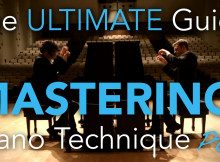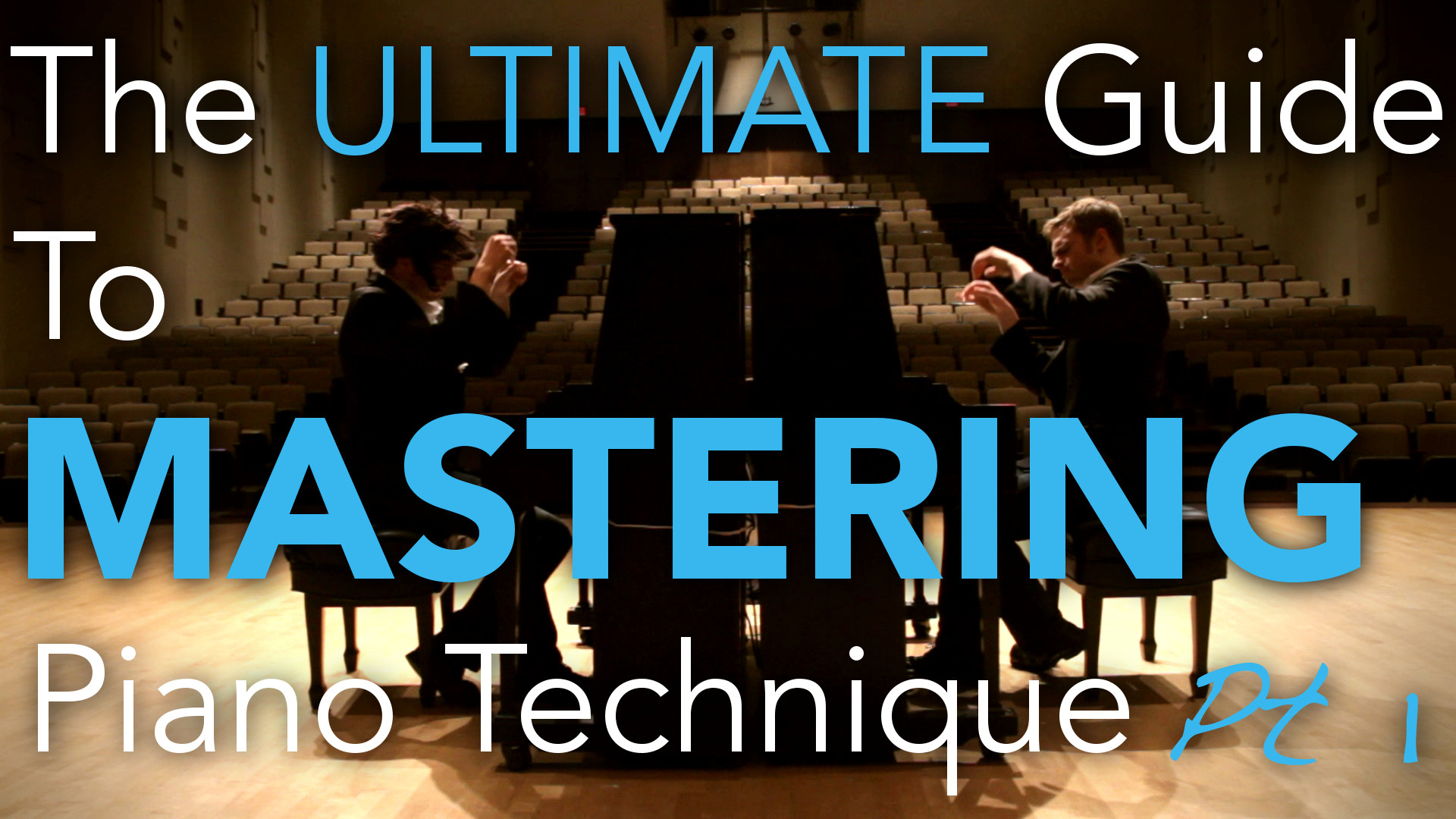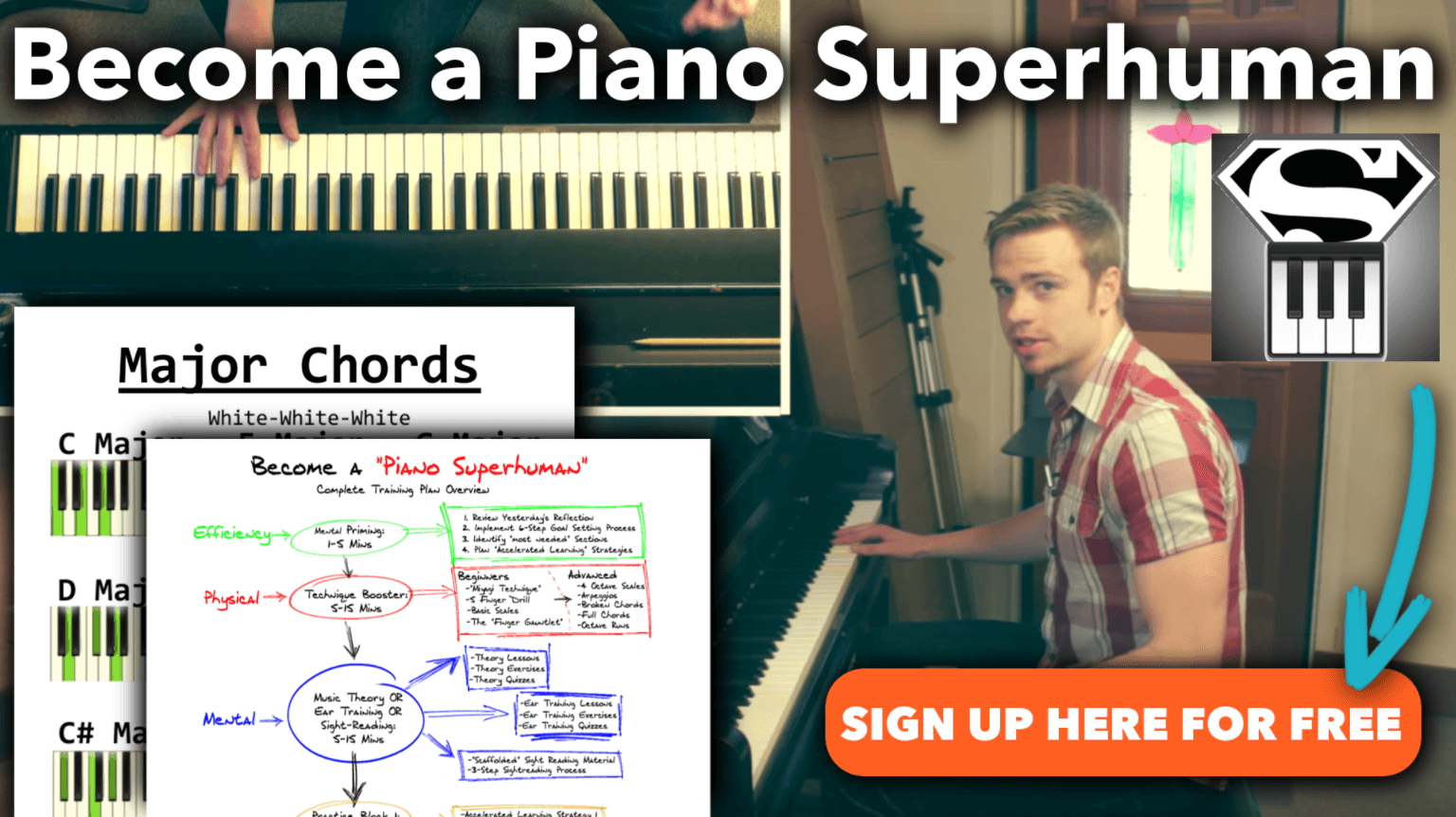You want to develop awesome piano technique. Good. Trust me, getting that next level technique will skyrocket your playing ability. All of a sudden your fingers will feel like the keyboard is their home, and everything you play will be easier and smoother. Oh, and you’ll be able to play the cool flashy stuff to impress your friends 😉
And here’s the best thing. Piano technique has been researched heavily. It’s easy to research because it’s a physical phenomenon that we can see and measure (as opposed to something like sight-reading where most of the action happens in your brain), and many people have come up with step-by-step ways to develop it. So all you have to do is follow the step-by-step process and you know you’ll have rock solid technique by the end of it.
So how do you develop technique? There are two main ways, and each are equally as important, so do both. The first is to develop a daily routine of drills and exercises that systematically build technique. The second is to play pieces that challenge you. So first I’m going to go over the two ways to learn technique, and then at the end I’ll give you guys an overview, kind of a training plan on how to learn it the fastest and most efficient way possible. Honestly, the second part is way more important because it gives you an action to take. You don’t learn piano by reading, so take what you learn from this and put it into practice right away!
Piano Technique Mastery 1: Daily Routine of Exercises
There are a number of exercises that are essential to good technique. Once you master these exercises, you’ll be able to play almost any passage from a physical standpoint. You can look at a section of music and be confidant that you’ll be able to learn it quickly. For each exercise, there is a specific way to practice it.
Practice all the exercises with correct form every time. Like every single time. Be disciplined about it because practicing them wrong won’t do you any good. You’ll just drill in the wrong technique and increase your chance for injury. So focus and do it right! Here are the main exercises you’re going to want to master:
1. Scales
Scales. I know, everyone hates them but they’re really the most critical exercise to develop technique. Pieces of music are full of scale-like patterns. If you look at almost any melody line, it will be full of snippets that look like mini-scales.
By knowing your scales well, you have learned all these parts of a melody without even practicing them directly! Scales are also important to orient your brain within a key. It can be difficult to remember what sharps and flats are in a key signature, but if you play scales enough you’ll not only learn the key signatures, but you’ll internalize them and have a deeper understanding of them. It’s almost like having a sixth sense where you can feel your way around the keyboard and know which notes are in the key and which are not.
The goal is to get your scales through four octaves in all the keys.
(btw, if you want a complete rundown on Scale Development, you can watch the webinar: Dominate Your Piano Scales in 5 Minutes a Day)
2. Arpeggios
The second most common lines are arpeggiated lines. Look at a melody and almost all the snippets will be either a mini scale or a mini arpeggio that outlines a chord. Just like scales, if you know your arpeggios well, you’ll already know all these little snippets before you even practice the piece!
Arpeggios also develop a more controlled, flexible wrist. The transition from the 3rd or 4th finger to the thumb forces you to turn and direct your wrist fluidly and accurately. This wrist flexibility will translate to a number of other different areas.
Now, these are different than the type of arpeggios I talk about in the Crazy Fast Piano Arpeggios lesson, (which goes over crossover arpeggios). These are just normal arpeggios, both hands playing together.
The goal is to get your arpeggios through four octaves in all the keys.
3. Chords
Chords are all over the place, and being able to play chords quickly in all inversions is a huge advantage to learning pieces faster. It’ll also help you improvise because your fingers will be able to “snap” to the chord shapes without you thinking about it and you can concentrate on the right hand. Practicing chords also helps tone production.
Start out with the Miyagi Technique as a beginner, and gradually move to full chords as you progress. When you do this exercise, you can really focus on getting that warm, round tone and develop a feel for that nice, even sound.
The goal is to get each inversion each major and minor chord sounding warm and full.
4. Broken Chords
Broken chords are found all the time in various left hand accompaniment patterns. Practicing broken chords also develops the fundamental over-under wrist motion you want to develop for anything you play on piano.
The goal is to be able to play broken chords through three octaves in all of the keys.
5. Octave Scales
I love octaves. You can take any single note melody line, play it in octaves, and it sounds way more exciting and way more powerful. You can also put it in the left hand bass notes to get that deep, commanding sound. Just my opinion, but regardless octaves are in a ton of music, so you might as well learn how to play them well. Octaves also help you develop a super relaxed wrist, which is critical to everything you play.
The goal is to be able to play octave scales through three octaves in all of the keys.
Piano Technique Mastery 2: Play Challenging Pieces
The first part will make your technique stronger, but you need to actually play pieces to transfer the new technique into playing ability. Think of it like a football player who lifts weights. Lifting weights makes you stronger, but it won’t make you a better football player until you transfer that strength to playing ability by practicing football. So challenge yourself!
Here’s my story with this. A long time ago, I saw a YouTube video for Jarrod Radnich’s “Pirates of the Caribbean” (here’s the link if you’re interested http://youtu.be/n4JD-3-UAzM) and I was amazed. It was flashy, fast, loud, and exciting, everything the testosterone-fueled-21-year-old I was wanted to learn. It was way out of my league, but I didn’t care, I had the attitude that if I put my head down and practiced hard enough I’d learn it. I spent the entire summer trying to learn it. An entire 4 months breaking it down, drilling it in, and trying to speed it up. I never learned it. By the end of summer I could play the whole thing at around half speed, not even close to the way it was supposed to be played.
But here’s the thing: my piano technique improved drastically. The effort it took to try and learn this piece pushed me to my limits, which led to fast improvement. Pieces I had struggled with before that summer were a piece of cake. Pieces I learned after that summer were much easier. I felt way more at home on the keyboard.
So find pieces that inspire you and challenge you. Pieces you think sound ridiculously awesome. And learn them. Etudes are great for this. Etudes are pieces that are specifically designed to work on one aspect of piano technique. But they still sound cool, they’re fun to play, and you can perform them as a piece of music. Check out some of Chopin’s etudes, they’re my personal favorite. Here’s one I learned that focuses on playing fast arpeggios: https://www.youtube.com/watch?v=1qk78WdDMIw
So that’s the basic plan for boosting your piano technique. Spend 10 to 15 minutes on your daily routine and pick difficult songs to learn. In part 2 I’m going to tell you exactly step by step how to work this into your practicing. Make sure you read it because it’ll tell you exactly what to do, when to do it, and how to progress as your technique progresses. Click Here for Part 2




I would like to stark immediately with Zac Evans method
Seemed fantastic. He very gorgeous on his piano technique
Hey Zach
What fingering are you using for the arpeggios?